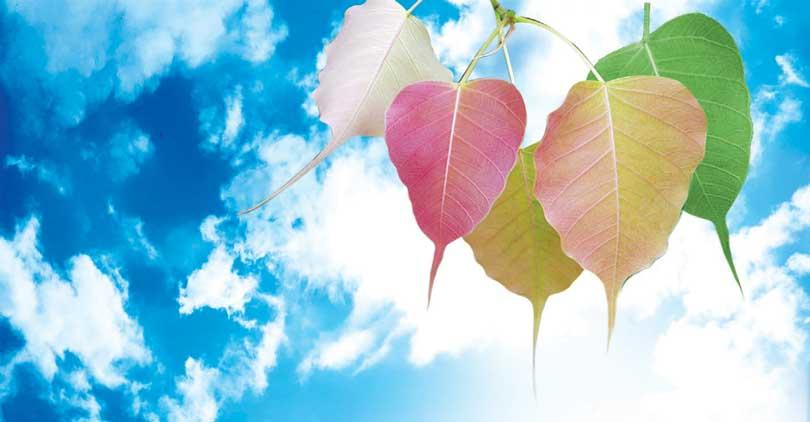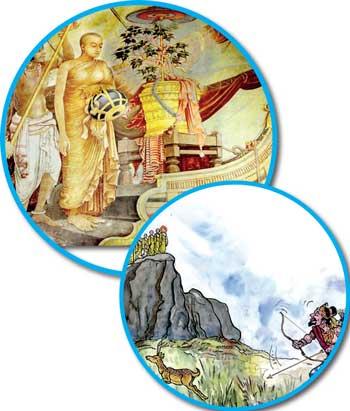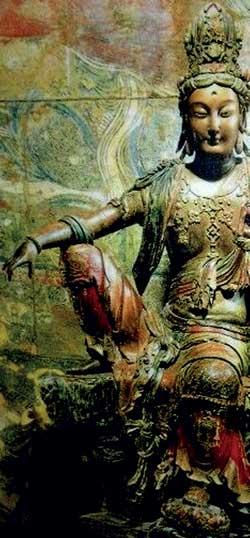Reply To:
Name - Reply Comment
Last Updated : 2024-04-24 14:25:00

 Today is the day of Esala Pasalosvaka Poya which primarily signifies Buddha’s First Sermon – the Dhammakkappavattana Sutta.
Today is the day of Esala Pasalosvaka Poya which primarily signifies Buddha’s First Sermon – the Dhammakkappavattana Sutta.
The Sermon which he preached to the five ascetics two solar months following the attainment of Enlightenment explained the Four Noble Truths: Dukkha (suffering,) the cause of Dukkha, the Cessation of Dukkha, the Path leading to the cessation of Dukkha and the Noble Eightfold Truth which set in motion the Wheel of the Dhamma.
This was the essence which the Sangha propagated.
What made Sri Lankans hail Ashoka as a great ruler was the fact that he despatched his two siblings, Mahinda and Sanghamitta to Sri Lanka to plant the seed of Buddhism – an iconic event which launched the Buddhist chapter in Lankan history. The Emperor, therefore, figured prominently in the ancient Lankan Pali chronicles. But to the dismay of present Indian historians, the chronicles have had little interest in the life and the military expansion of the Emperor.
However, what is known of the early days of the Emperor and his feats in the battlefront are not well known.
Ashoka in Ancient India, written by Nayanjot Lahiri, of Ashoka University, Delhi, has delved deep into events connected with the early life of Ashoka with little known
facts interspersed.
Particularly of interest to Lankan readers, however, is its tracing of Ashoka’s first romantic liaison as its reproductive outcome was vital to ancient Lankan chronicles due to its impact on Sri Lanka.
Quoting extensively from the two Lankan Pali Chronicles, the Sanskrit text Ashokawadana of the 2nd century CE and other texts, he writes that the daughter of a merchant known by the name of Devi, having cohabited with Ashoka, gave birth to the noblest son. A later account of Dipavamsa echoes the earlier statement that Ashoka made Devi his wife and she was (afterwards) with child by him and bore in Ujjayini a beautiful boy named Mahinda. When two years had passed, (she bore) a daughter by the name of Sanghamitta.
Ashoka on reaching adulthood was made viceroy by his father Emperor Bimbisara. He was sent to administer the state of Avanti from the city of Ujjayini which was a distance of nearly a thousand kilometres from Pataliputra, the Capital from where he set out. It was when he stopped over in Vidisha (modern Besnagar,) about 250kms before Ujjayini that the whirlwind courtship took place, resulting in the birth of two children that turned out to be central to the life of Ashoka.
 The author laments that unlike many romantic tales of antiquity, theirs was one of unsatisfactory brevity. Nothing was known of Devi’s early life before she met Ashoka except that she was elusive and was extraordinarily pretty. There had however been disagreement on the legal state of this relationship. Quoting from Romila Thapar’s “Ashoka and the Decline of the Mauryans,” the author writes that Devi was “not legally married to Ashoka.” Dipavamsa says it was a “samvasa” which may mean co-living, presumably within a conjugal relationship.
The author laments that unlike many romantic tales of antiquity, theirs was one of unsatisfactory brevity. Nothing was known of Devi’s early life before she met Ashoka except that she was elusive and was extraordinarily pretty. There had however been disagreement on the legal state of this relationship. Quoting from Romila Thapar’s “Ashoka and the Decline of the Mauryans,” the author writes that Devi was “not legally married to Ashoka.” Dipavamsa says it was a “samvasa” which may mean co-living, presumably within a conjugal relationship.
The absence of a “legal” marriage could be the reason why Devi did not become Ashoka’s chief queen after his consecration. However, whether or not Devi was declared as the chief queen, the children she bore him, grew into a stature much greater than those who succeeded him to the throne. And his interlude in Ujjayini was particularly significant to Sri Lanka due to the role their children played in the island.
Pali sources according to Ananda Guruge, may have taken special care to preserve the memory of this phase as it was on his way to Ujjayini that Ashoka encountered Devi. His halt at Vidisha where he enjoyed the hospitality of the guild-chief Deva, appears plausible as interaction with men of commerce and collecting revenue for the Mauryan state, especially from traders and merchants, may have been the function of the viceroy.
Was Devi a Buddhist at the time Ashoka met her? Pali texts suggest that she followed the Doctrine but there is no mention of her having converted Ashoka. And the fact that Ashoka had loved and lived with a woman remembered by history as a Buddhist, does not seem to have influenced the trajectory of his life. His long sojourn at Ujjayini came to an end when some ten years later, he had to return to Pataliputra on Emperor Bimbisara falling ill.
The Mahavamsa had briefly mentioned that upon Bimbisara’s illness, Ashoka returned to Pataliputra, caused his elder brother to be slain and took on himself the sovereignty.
Dipavamsa numbered the brothers at hundred as those killed by Ashoka in his bid to capture the throne. Ashokawadana’s version was that the royal courtiers, offended by an act of the heir-apparent Susima, ensured that he would not succeed Bimbisara but Ashoka.
Ashoka was consecrated in 269/268BCE, four years after the massacre of his relatives.
The Dipavamsa notes that Mahinda was ten years when his father put his brothers to death. He was anointed King in Mahinda’s 14th year and Sanghamitta’s 12th year.
 Author Lahiri states that the conquest of Kalinga in 260 BCE, plunged Ashoka into an emotional crisis when he lost interest in conquering new territory. His remorse followed a search for the Truth when he came upon Bhikku Nigrodha looking for alms on a road to Pataliputra. On request, the bhikkhu offered a sermon that “earnestness is the way to immortality.”
Author Lahiri states that the conquest of Kalinga in 260 BCE, plunged Ashoka into an emotional crisis when he lost interest in conquering new territory. His remorse followed a search for the Truth when he came upon Bhikku Nigrodha looking for alms on a road to Pataliputra. On request, the bhikkhu offered a sermon that “earnestness is the way to immortality.”
Since then, promoting and propagating Buddhism became the hallmark of his reign. The conviction extended to such an extent that his children by Devi, took to robes along with several close family members.
The recurrence of schisms in the empire in the meantime, made the Buddhist establishment seek the Monarch’s intervention in imposing stronger measures against factionalism. Ashoka responded by convening the Second Buddhist Council in the 18th year of his consecration which sent Ashoka’s progeny on a Buddhist Mission to Sri Lanka.
With Buddhism progressing well within and outside India, the Emperor commenced the tradition of building stupas in India. His largest stupa came up in Ujjayini, the city where Devi took residence. Mahavamsa mentioned that when Arahant Mahinda made his last visit to his mother in Ujjayini before leaving for Sri Lanka “Devi led him up to the lovely vihara Vedisagiri.” Because it was built on a hill, it is believed that the monastery the mother chose to take her monk-son and his companions was Sanchi.
The book quoting from Mahavamsa, mentions 4 more names of queens of Ashoka – Asamaditta, the chief queen who died in the 29th year of Ashoka’s consecration. His second queen identified as Karuvaki was the mother of Tivala. Four years after the death of Assamaditta, Ashoka raised Tissarakka to the rank of the queen, who caused the great Mahabodhi Tree to perish. Queen Padmavathie’s son was Kunala. His son Sampadin succeeded Ashoka when he died in the 37th year after his consecration.

Add comment
Comments will be edited (grammar, spelling and slang) and authorized at the discretion of Daily Mirror online. The website also has the right not to publish selected comments.
Reply To:
Name - Reply Comment
US authorities are currently reviewing the manifest of every cargo aboard MV
On March 26, a couple arriving from Thailand was arrested with 88 live animal
According to villagers from Naula-Moragolla out of 105 families 80 can afford
Is the situation in Sri Lanka so grim that locals harbour hope that they coul